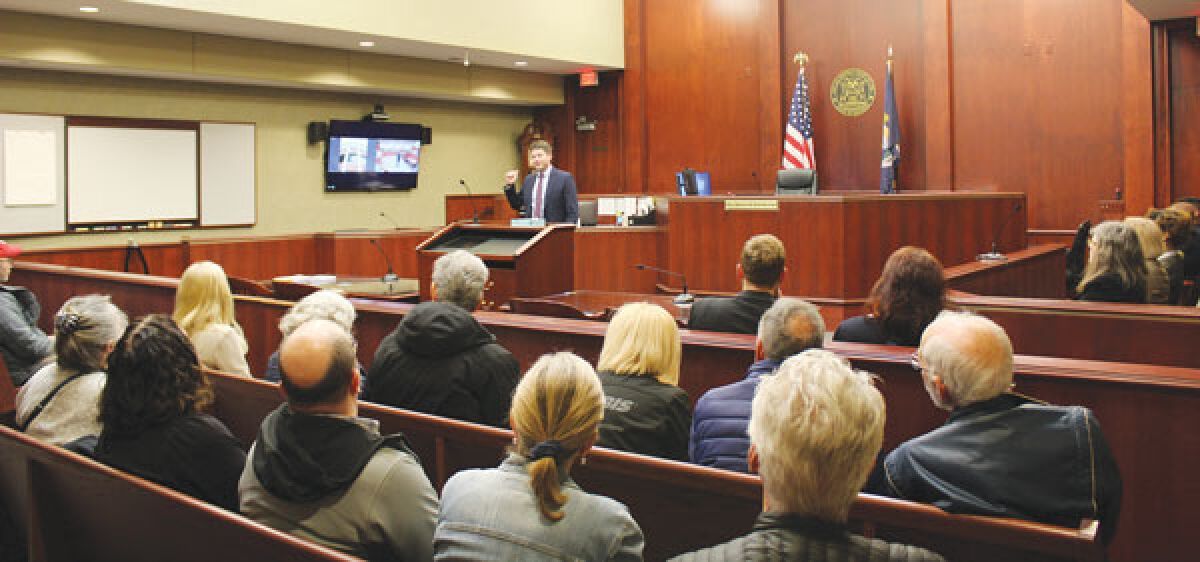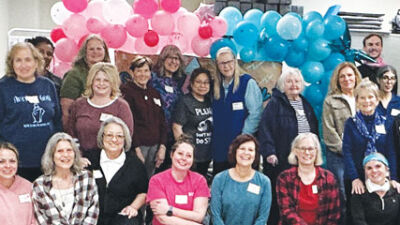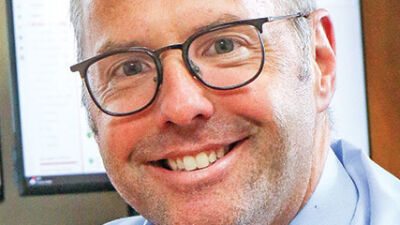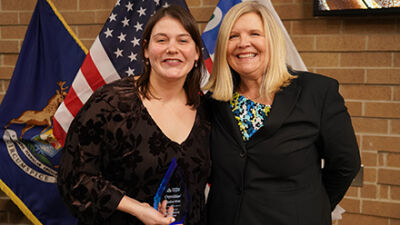ROYAL OAK — The 44th District Court, which serves Royal Oak, had the public in the courtroom at the April 24 Justice Open House event to speak about the initiatives that the judges currently have in place.
Judge Andrew Kowalkowski and Judge Derek Meinecke led the discussion and spoke about the Justice 101 Program, Teen Court, Hybrid Drug Alcohol Court and Operation Drive.
On Tuesdays throughout the school year, elementary students from Royal Oak and Berkley are invited to learn about the court system and visit the court in the Justice 101 Program.
The program engages the students by preparing them prior to seeing a court case. This is to help them understand better what they are about to see and why they are learning about it, according to Meinecke.
Meinecke said that he wants to create a safe environment for the students to see that he is just a human being himself.
“The more that they can see someone in different professions look like them and act like them makes it more attainable for them,” he said.
Meinecke said that every Royal Oak and Berkley fifth grade student will go through the Justice 101 program. There have been 27 classes so far.
The Teen Court program was the second program discussed. This program is a collaboration between the 44th District Court and the Oakland County Prosecutor’s Office.
Teen Court is a juvenile diversion program for first-time offenders involved in misdemeanor offenses, according to romi.gov. Kowalkowski is the sit-in judge for this program.
“They (the teens) have admitted responsibility that they committed this act but entered into an agreement with the Oakland County Prosecutor’s Office to divert away from the juvenile court system,” Kowalkowski said.
Defendants have committed misdemeanors such as alcohol/drug offenses, disorderly conduct, curfew violations, vandalism, retail fraud, and sending explicit photos by text or social media, according to romi.gov.
Kowalkowski explained that the defendant will face a jury of their peers, after a “student defense attorney” and “student prosecutor” ask the defendant questions. Adult mentors also assist the students during this process.
“Just like a real jury, they deliberate and make a decision, come back out, and they will make a recommendation on what the sentencing should be,” Kowalkowski said.
Sentences for these cases could involve community service, an apology to their parents or friends, or whatever the jury comes up with that seems appropriate to Kowalkowski.
The next program discussed was the Hybrid Alcohol/Drug Treatment Court, or HADTC.
HADTC is a voluntary program available to those suffering from drug or alcohol addiction to “address and reduce substance abuse problems among participants,” as stated in the HADTC handbook.
This treatment program is intense, as explained by the judges, but it is well worth the dedication.
“That is the beauty of this program, is that there is evidence behind it and it works,” Kowalkowski said. “The state has done countless studies, there is a best practices manual, and that is what this is modeled after.”
Participants are sentenced to a 24-month probation term, which includes four phases each lasting four months. The phases include multiple steps to be completed before the person can move to the next phase.
“The best way to enforce that is through a monitoring program, which requires drug and alcohol testing, support group meetings, therapy, and obtaining a sponsor in phase one,” Kowalkowski said.
Kowalkowski said participants are also asked to write a series of reflection essays that communicate to the court that they are starting to internalize the lessons throughout the program.
Programs such as this have shown the two judges that change is possible, no matter how “far gone” an individual seems. Meinecke reflected on his own personal experience with a family member who suffered from alcohol addiction.
“I learned right out of the gate that it affects everybody, and that the stakes are high, but people can come back,” Meinecke said.
The final initiative presented was Operation Drive, a program developed by Meinecke in March of 2016 to help individuals regain driving privileges.
“I will tell you we have been making a tremendous difference here at the 44th District Court,” Meinecke said. “We’re now close to 1,600 licenses restored in eight years.”
People who are in this program are likely to have a revoked license, suspended license or have never obtained a license, according to the Operation Drive handout presented at the open house.
“The goal is to work with people that come into our court system for traffic misdemeanors and get them a valid license,” Meinecke said.
The best way for residents to learn about future events similar to the Justice Open House is to sign up for the city’s weekly e-newsletter at romi.gov/eblast.
 Publication select ▼
Publication select ▼




























